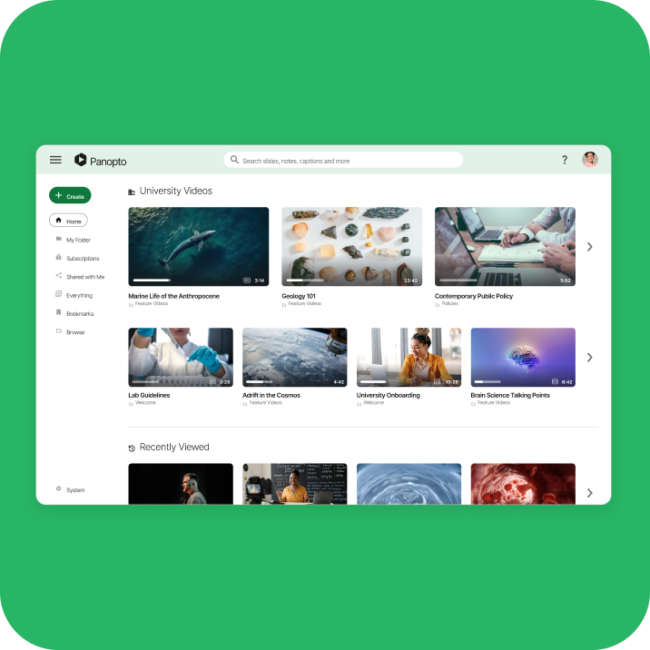- Academic Technology
7 Considerations for Delivering Successful Online Courses
Not long ago Appalachian State professor Thomas Mueller was kind enough to join us for a webinar to share his experience delivering classes online and the 7 considerations he’d recommend to anyone hoping to hold their own web-based courses.
We’ve just added Professor Mueller’s presentation to SlideShare and provide an overview of the key points below.
So what are Dr. Mueller’s 7 considerations for delivering successful online video?
#1: Define Your “Portal”
You’ll need somewhere for students to interact with you as the instructor, as well as to receive and return assignments, post questions, and hold discussions with other students – somewhere you can replicate all the social and logistical elements of a traditional classroom.
Many schools already have such a website established in the form of an LMS. Appalachian State, for example, uses Moodle.
#2: Make Full Use Of All Your Online Communication Channels
Along with your portal, it’s important to plan for how you’ll use a variety of communications channels to deliver your class.
Email and messaging tools are useful for delivering specific one-to-one or one-to-many messages, as well as for creating a virtual paper of interactions.
Student forums, news forums, social groups on sites like Facebook or Google+, and other related wiki pages are helpful tools to foster class discussions on the topics of your choice.
Interactive audio/visual tools like Panopto are valuable means to increase online classroom engagement, and better replicate the lecture experience.
And testing, quizzing, and assignment submission tools commonly found in your portal will, of course, be essential for measuring student performance.
#3: Require Students To Plan For Connectivity
This may mean updating to modern web browsers to ensure compatibility with your portal and other online systems or finding access to reliable and reasonably high-speed internet.
Whatever you choose, it’s important to make it clear up front that connectivity and access are the student’s responsibility, and that failure on their part here does not excuse missed classes, overdue assignments, or a lack of participation in online activities.
#4: Expect Students To Expect Mobile Compatibility
It’s no secret that students have become more and more directed toward mobile devices to meet their web access and computing needs. It’s likely even that a few of your students will not have a traditional desktop or laptop, and will be accessing the online elements of your class exclusively via tablet or smartphone.
As such, it’s a good idea to review the mobile capabilities of your portal and any online communications tools you plan to use. Many portals and learning tools have native mobile apps, and most offer mobile-specific versions of their websites.
If your school’s portal doesn’t account for mobile, or restricts certain activities to desktop- or laptop-based browsers, consider talking to your school’s technical team to ask about workarounds or alternatives for “mobile-first” students.
#5: Review And Test IT Support Ahead Of Time
Every school’s systems are a little different and every school has different procedures in place for providing technical support.
It’s a good idea for you to test everything you plan to use well before the first day of your class, and to understand how to get support when needed. Every system experiences some downtime – it’s important for you to understand how to respond in the case of an unexpected technical challenge.
Likewise, it’s also important to instruct your students on how they can access tech support. Make this a part of your classroom policy, and be sure to inform students that technical issues are generally theirs to manage, and that technical difficulties do not, in general, excuse them from course engagement or assignment deadlines.
#6: Insist On Academic Integrity
The anonymous nature of the web can lead some users to believe they can behave in less-than-scrupulous ways. Set the tone for your class early, and let everyone know that just like a traditional class, you’ll expect self-regulation for online honesty. It may be helpful to devote the first class to discussion on this subject.
Should you find you want to implement technology to further ensure integrity, you may consider the use of online proctoring tools for tests. A video capture solution like Panopto can make recording, uploading, and reviewing such recordings easy.
#7: Be Proactive In Your Instructional Approach
Key to success in delivering online courses is simply setting expectations up front and making sure everything that needs to be available is, right from day 1.
For some students, this will be their first online class experience as well. You’ll want to set expectations about how they should approach online learning and the expectations you have for interaction.
You’ll want to ensure students can find everything they need, from documents to email addresses and forum links, and you’ll want to make sure you stay consistent with that information and those tools throughout the length of the class.
Lastly, you should embrace and master the technology you’ve chosen to use. Students will be looking to you to model what they can and should be doing with the online learning tools you’ve included, and will likely even expect you to be able to answer basic how-to questions on their use. And just like any tool, you’ll get more out of your online learning technology if you truly understand how to use it.
Looking for a lecture capture solution to help enable your online classrooms? Try Panopto free.




